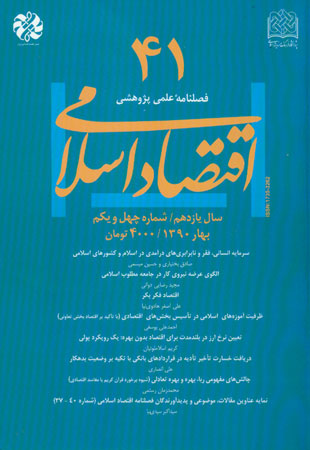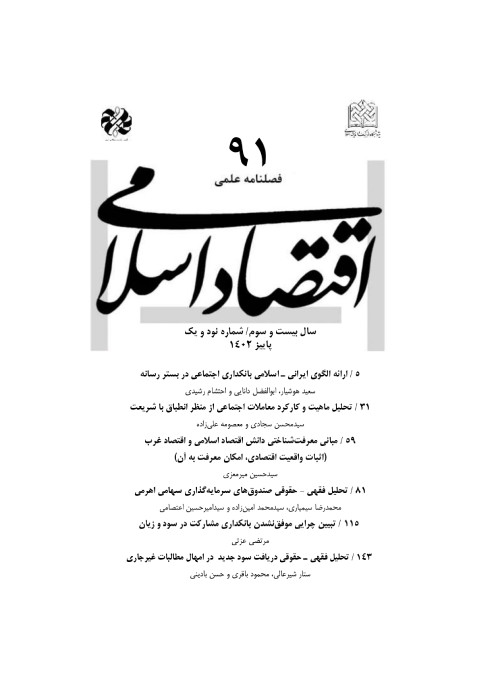فهرست مطالب

فصلنامه اقتصاد اسلامی
پیاپی 41 (بهار 1390)
- 246 صفحه، بهای روی جلد: 40,000ريال
- تاریخ انتشار: 1390/02/13
- تعداد عناوین: 9
-
-
صفحه 69
-
صفحه 231
-
Page 5Having gone over the concepts of poverty, income inequality and components of human capital such as healthcare and education, from an Islamic point of view and the available literature in conventional economics about, this paper investigates the relationship between income distribution and poverty in Islamic countries. In fact, it tries to evaluate the effects of strengthening human capital components on poverty and income inequality reduction. The results show that Islam has paid enough attention to boosting human capital components and inequality reduction in Muslim population. In addition, the empirical findings of this research, using a panel data set for 49 Islamic countries over eight time periods, suggest that there is a negative but meaningful relation between the human capital and poverty and income inequality in Islamic countries.Keywords: Human capital, Poverty, Income inequality, Islamic countries, Islamic economics
-
Page 39Main principals of deriving work force supply in the favorable society, is the quality of allocation of the time of a Muslim to work and leisure time and this allocation is done according to motivation, belief and needs of work force. A Muslim according to beliefs, sentences and Islamic ethics, considers the economic activity as a good work. Other factors are wage, social needs of society, poverty and social security. The variety of factors causes the relative stability of work force supply in the volatility of wages.This research with a descriptive-analytical approach, tries to present a work force supply pattern in a favorable Islamic society. For this purpose, it proposes assumptions and derives the model using mathematical methods. Findings show that the work force supply of a Muslim has different from conventional pattern and for cultural and religious factors, has a relative stability.Keywords: Work market, Work force supply, Favorable Islamic Society, fixed wage, Participation in profit
-
Page 69New Idea economy tries to consider the new Idea as a commodity, and to analyze its players. New idea is a thought that because of its new advantage is exchanged.The main question is that “can market pricing system provide a proper motive for economic players?”. The importance and position of new idea becomes evident when its role in economic growth and development is considered.In this paper, a special method has been proposed for economic analysis of new Idea. In this method, new idea is proposed in three aspects and in each aspect; it is proved that the market pricing fails in providing proper grounds for motivation of economic players. So, other institutions such as government,intellectual property or public culture should act. Another path also can be followed that is available only in Islamic economics that is the attention to nonmaterial rewards in the new idea. Tawakkol is a good index in the efficiency of Islamic economics in this respect.Keywords: New Idea economy, Innovation economy, Knowledge economy, Public good, external effects
-
Page 101After failure of private sector in poverty reduction, capitalism functioned a major role in economy. The mixed and two-part economy has also been unsuccessful in economic problems, because capitalists dominated all the parts of government and acted on behalf of their own benefits. After demonstrating economic problems as lacking ethical teachings, economies followed the non-profit economy, but it could not solve the problems. Therefore, some authorities suggested the cooperative economy as the solution, but the problems became bitter.The author believes that for solving economic problem, there should be a four part economy. The capitalism teachings have not the enough capacity for this kind of economy and instead the Islamic economy teachings have this capacity. This research with a descriptive-analytical approach and comparing the capacities of Islamic teachings and capitalism teachings, establishes a four part economy according to Islamic teachings.Keywords: Islamic economics, Capitalism economics, Public sector, Private sector, Cooperative sector, charitable sector
-
Page 131Using a monetary approach, this paper determines long-run exchange rate for an interest-free Islamic economy. First, we solve the model for the case when two hypothetical interest-free economies are engaged in international transactions.Next, we extend the model to discuss exchange rate determination when one interest-free economy is engaged with an interest based economy. Our prior assumption is that individuals in the interest-free economy hold money only for transaction and precautionary motives. Next, we assume that individuals in an Islamic economy might also hold money for speculative motive. Hence, the opportunity cost of holing money enters into money demand function. Using purchasing power parity and interest parity condition, we solve the model and show that long-run nominal exchange rate for an interest-free economy is determined by paths of domestic money supply, domestic price levels, foreign income and expected profit rate.Keywords: Interest, free economy, monetary approach, exchange rate, speculative motive, expected profit rate
-
Page 161Receiving delay compensation has been one of the challenging issues of jurisprudence and law in Iran banking system. Regardless of different views expressed in defining the nature of the delay compensation, all experts agree on necessity of getting this type of fee, especially in the banking system. Guidelines provided for receiving delay compensation in the banking system, have been encountered with some critics. Although, from different directions the delay compensation has been accepted, but the critic is that the status of bank debtors has been not considered. In this paper, distinguish between different types of debtors using legal capacities and justifying prohibited delay compensation in the insolvency and bankruptcy situations, has been considered.Also regarding to the nature of the participatory contracts, receiving delay compensation in these contracts does not seem correct based on existing methods. In this regard, some solutions have been suggested.Keywords: delay compensation, banking contracts, liquidated damage, insolvent, bankrupt
-
Page 189One of the problems of banking system, according to Islamic economics.is philosophy of prohibition of riba, its effects and the methods of opposing riba. According to broad instances of riba, it is necessary that the main approach of discussions be concentrated on its major instances and the most practical ways of opposing it. Stress on the generality of prohibition of riba. Has withheld the Islamic economists from proposing o planned program for classification of different ribas and corruption and opposing it.According to Islamic teaching, prohibition of riba is a criteria in opposing non-productive activities and in optimum allocation of capital into production activities complete and real elimination of riba with is not possible except providing proper grounds for business. All the economic corruption such as riba should be rated and gradually opposed. This paper with analytical descriptive approach after explanation of concepts of riba, interest and balanced interest concludes that Quran’s method in elimination of riba from economic activities could be generalized to other economic corruptions.Keywords: Riba, Interest, Balanced Interest, Productive Investment, Nominal return, Real return


